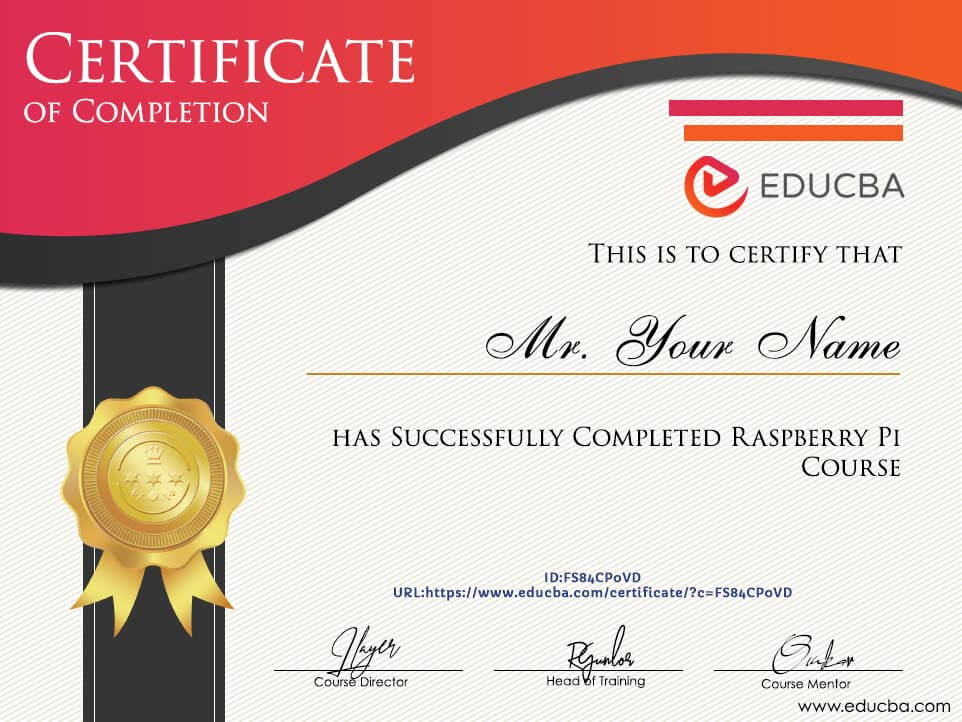RASPBERRY PI
Specialization | 2 Course Series
This Online Raspberry Pi Training includes 2 courses with 13+ hours of video tutorials and One year access. Through this course you get to learn about the essentials of Raspberry Pi specifically required for Internet of Things (IoT) technology. We will focus on Raspberry Pi introduction and setup, Python for Raspberry Pi, Accessing GPIO pins, Using PiCamera, Networking using sockets and home automation.
Offer ends in:
What you'll get
- 13+ Hours
- 2 Courses
- Course Completion Certificates
- One year access
- Self-paced Courses
- Technical Support
- Mobile App Access
- Case Studies
Synopsis
- Courses: You can access all 2 courses, including the Projects bundle. You do not need to purchase each course separately.
- Hours: 13++ Video Hours
- Core Coverage: The main aim of this course is to learn about the essentials of Raspberry Pi, specifically those required for the Internet of Things (IoT) technology.
- Course Validity: One year access
- Eligibility: Anyone serious about learning Raspberry Pi Training
- Pre-Requisites: Basic knowledge of electronics and programming
- What do you get? Certificate of Completion for each of the 2 courses, Projects
- Certification Type: Course Completion Certificates
- Verifiable Certificates? Yes, you get verifiable certificates for each course with a unique link. These links can be included in your resume/LinkedIn profile to showcase your enhanced skills
- Type of Training: Video Course – Self-Paced Learning
Content
-
Section 1
Courses No. of Hours Certificates Details IoT Raspberry Pi with Projects 11h 19m ✔ IoT Raspberry Pi for Programmers with Projects 2h 24m ✔
Description
Computers have been an integral part of our technological development. They have exponentially accelerated scientific breakthroughs, thereby improving our quality of life. While advancing our community, computers have opened up new demands for varying devices and automation. The advent of IoT infrastructure is one example that requires powerful machines in all form factors. One such invention is Single-board computers. These compact, lightweight machines provide easy customization for varying needs. It usually contains a wide range of microprocessors, ICs, and input and output interfaces.
“An SBC is a computer in which a single circuit board comprises memory, input and output, a microprocessor, and other features. They are mostly used in embedded systems and applications like complex robotic systems and the Internet of Things (IoT).”
Raspberry Pi is one of the most popular SBCs in the market today. Its hardware and software have evolved to cater to the most demanding tasks while maintaining a simple credit card design. The excellent community support makes it a beginner-friendly device as well. With many use cases and customizations, Raspberry Pi sits between bulky computers and traditional microprocessors and has been extensively used for scientific experiments, simple POCs, cheap media players, home automation, etc.
The Raspberry Pi is initially invented for educational purposes using a microcomputer consisting of a processor, RAM, HDMI port, audio output, and USB ports. Later, the device widened its scope for creating computers and open-source programming for software creations. The device looks like a motherboard, mounted with chips and ports containing all components that connect input, output, storage, etc.
“Raspberry Pi is a compact, credit card-sized single-board computer with all computer functionalities with high definition multimedia capabilities. It is constructed under ARM architecture with 256 MB RAM & Linux OS”.
Sample Certificate

Requirements
- The prerequisites completely depend on the complexity of the problem. It varies according to application usage and features. The basic requirements to learn from this Online Raspberry Pi Course would be:
- Raspberry Pi board
- USB-type Power supply
- A PC connected to the internet for OS image downloads
- HDMI monitor & cable.
- USB Keyboard & Mouse
- Micro SDHC card
- Wired Ethernet connection or USB Wi-Fi dongle
Target Audience
- Raspberry Pi allows everyone to learn and explore its various models to make the power of computing and digital explorations reach across the globe. This Raspberry Pi Training helps beginners and programming experts. We can develop our design thinking from the training for educational purposes, social innovations, IoT creations, etc.
Offer ends in:
Training 5 or more people?
Get your team access to 5,000+ top courses, learning paths, mock tests anytime, anywhere.
Drop an email at: [email protected]
